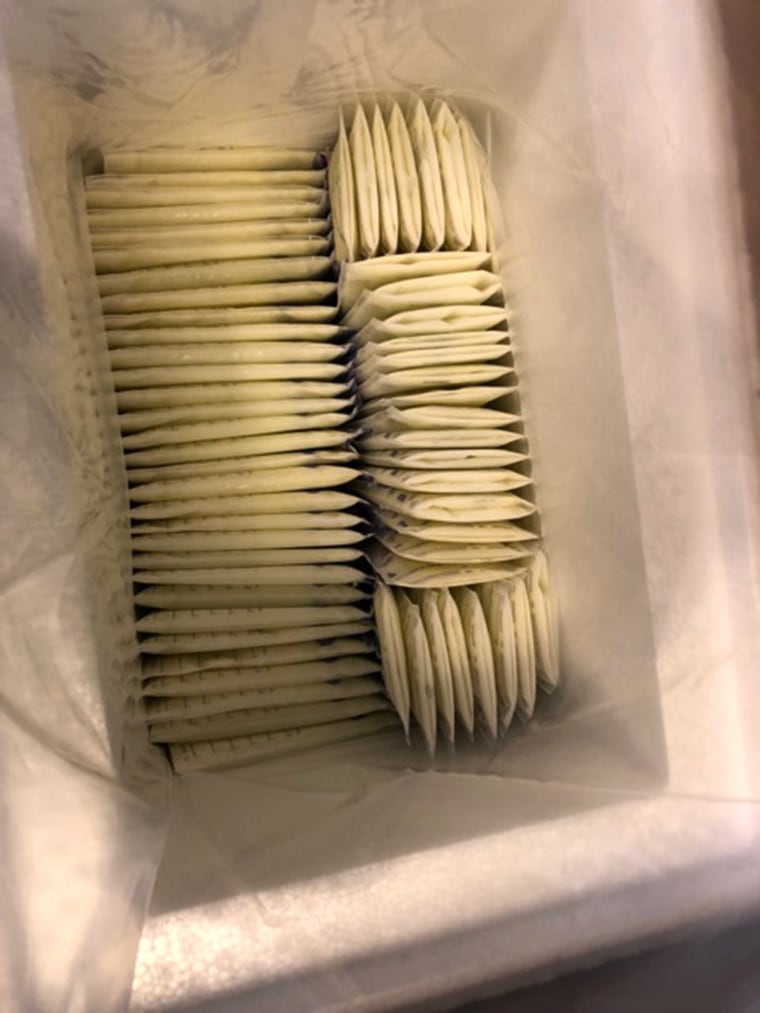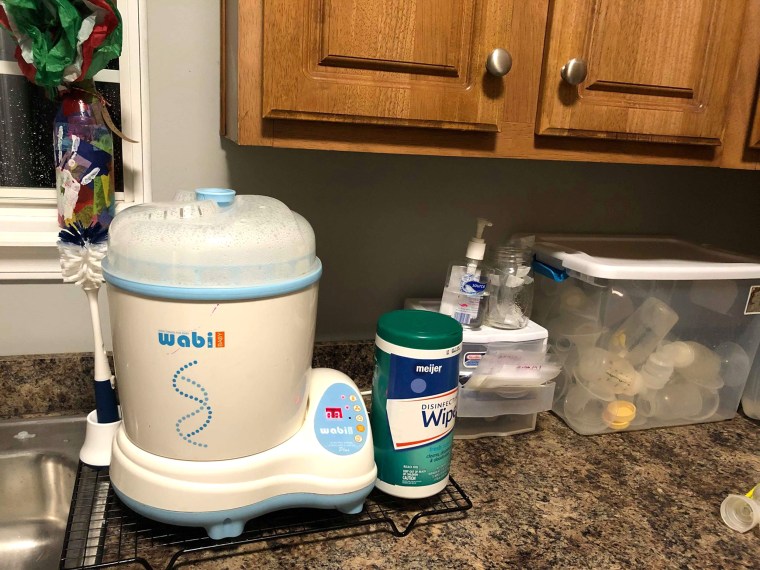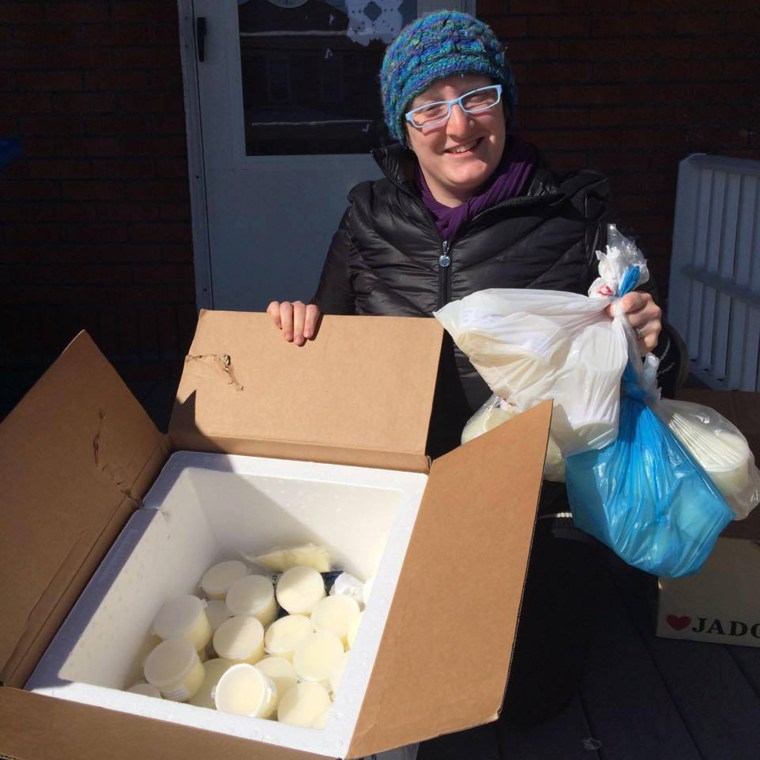After Nicole Marie Cowles delivered a baby that she was a surrogate for in October 2018, she was still lactating. Without a baby to feed, she worried her milk would be wasted. But she decided to pump for a for-profit milk bank that helps premature babies thrive.
Each month she sends them about 1,600 to 2,400 ounces of milk, which she expresses every three hours for about 30 minutes each time. It takes her 35 hours a week to pump, which is why she’s glad they compensate her $1 per ounce of breastmilk.
“There is such a stigma surrounding milk selling. In my case because all my milk is excessive it’s unfair to be expected to do it with no gain,” the 31-year-old mom of three told TODAY Parents via email. “My time is worth something. I take time away from my family to do this. I pump on vacation and when I am sick.”

Cowles is one of many women who shares her breast milk with others. Sometimes women give it informally to friends who might not have enough and worry about using formula. Others donate it to one of the 27 nonprofit milk banks in the United States or Canada that take breastmilk from screened volunteers who aren't financially compensated. And still others sell their milk to for-profit milk banks or direct to families online.
Experts applaud women for donating their breast milk, but they also remain wary about selling or informally sharing milk.
“Most moms clearly have gotten the message that breast milk is better for their babies,” Dr. Joan Meek, immediate past chair of the American Academy of Pediatricians’ section on breastfeeding, told TODAY Parents. “The issue is (for milk) from a stranger over the internet there are risks.”
One reason women might turn to informal sharing or buying milk off from the internet is that demand is greater than supply.
“There’s not enough to go around,” Dr. Abeba Berhane, a pediatrician at Helen DeVos Children’s Hospital in Grand Rapids, Michigan, told TODAY Parents. “There are multiple layers that affect how available breast milk is. The neonatal intensive care unit does have priority of the breast milk.”

The nonprofit banks associated with the Human Milk Banking Association of North America (HMBANA) shares milk first with babies who need it the most.
“It goes to the most fragile infants and sickest babies,” said Julie Bouchet-Horwitz, executive director at the New York Milk Bank, one of the HMBANA banks. “We have enough. That is not true for all banks. Our bank has a lot of milk.”
Sick and premature babies thrive when they receive human milk, which many stressed moms struggle to produce.
“The more premature the baby the more desirable it is they only get human milk,” Meek said. “Babies who are very ill tend to tolerate human milk better (than formula).”
To donate for one of the HMBANA banks, women need to share a health history, including medications that they’re taking, and undergo a blood screening to make sure they don’t carry any transmittable illness, such as HIV, hepatitis, B and C or syphilis. The bank also pasteurizes the milk to reduce viral or bacterial growth. For-profit and nonprofit banks follow similar procedures, but often differ when it comes to mission.
“There are for profits that are safe that are doing standards very similar to ours and have a perfectly good product,” said Lindsay Groff, executive director of the Human Milk Banking Association of North America.
But, buying milk online — for example from Craigslist or Facebook — or getting it from an informal network comes with potential problems.
“Milk buying is a whole other thing. When a study was done, (some) mothers were adulterating the milk and adding formula or cow’s milk to stretch it. That is the danger of purchasing milk online,” Bouchet-Horwitz said.
There’s also an increased risk of the milk having bacteria or viruses in it, especially if it is not stored properly or pasteurized.
Many women trust their friends and family when it comes to milk sharing. When Katy Rank Lev was breastfeeding her oldest son, she needed to supplement his supply with formula. With her second son she tried to only use breast milk so when she suffered a nipple injury, she gladly used breast milk from a friend.
“If someone is pumping milk that they would feed to their own baby, I feel like in those situations I have to trust humanity,” the 38-year-old writer and mother of three told TODAY Parents.

As she started producing more milk than she needed, she donated to the Mid-Atlantic Mothers’ Milk Bank, part of HMBANA. She remembers guarding her first shipment of milk until the delivery person came because she didn’t want anyone to steal 200 ounces of breast milk from her porch. But, she felt happy she was helping mothers and babies who needed it.
“The milk bank often talks about the stressors of having a baby in the NICU and not being able to produce milk. Helping release another mother’s burden felt really good,” she said. “It was very difficult for me to realize that I needed to supplement with formula for my first son. To then to be able to not only have enough milk but also have milk to share … it felt really good.”